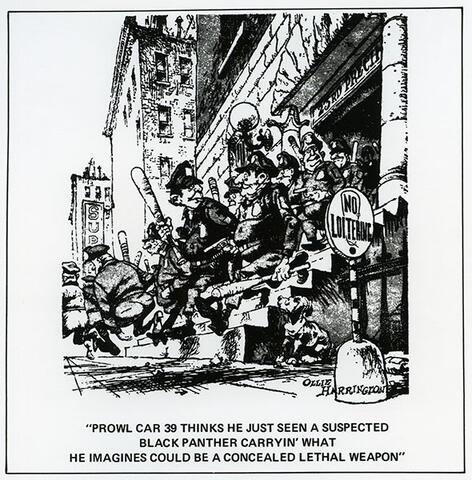
Zona do título e menção de responsabilidade
Título próprio
Black Panthers - Editorial Cartoon
Designação geral do material
- Material gráfico
Título paralelo
Outra informação do título
Título e menções de responsabilidade
Notas ao título
Nível de descrição
Item
Entidade detentora
Código de referência
Zona de edição
Menção de edição
Menção de responsabilidade da edição
Zona de detalhes específicos de materiais
Menção da escala (cartográfica)
Menção da projecção (cartográfica)
Menção das coordenadas (cartográfico)
Menção da escala (arquitectura)
Autoridade emissora e denominação (filatélica)
Zona de datas de criação
Data(s)
-
1969 (Produção)
Zona de descrição física
Descrição física
1 negative : b&w ; 10.16 x 12.7 cm
Zona dos editores das publicações
Título próprio do recurso continuado
Títulos paralelos das publicações do editor
Outra informação do título das publicações do editor
Menção de responsabilidade relativa ao editor do recurso contínuo
Numeração das publicações do editor
Nota sobre as publicações do editor
Zona da descrição do arquivo
Nome do produtor
História custodial
Âmbito e conteúdo
Cartoon by Ollie Harrington of a crowd of police carrying bats running out of the 23rd precinct with the caption, "Prowl car 39 thinks he just seen a suspected Black Panther carryin' what he imagines could be a concealed lethal weapon".
Bio/Historical Note: On 17 November 1969, three members of the Illinois chapter of the Black Panthers addressed four separate campus audiences during a tour of western Canadian universities. Their stop in Saskatoon was cut short a few days later with the deportation of two of the three. A week later the most dynamic of the speakers, Fred Hampton, was dead - shot to death in his bed by Chicago police. Formed in 1966 by chairman Bobby Seals, the Marxist-Leninist Black Panthers advocated the use of violence to obtain political goals. Rapid growth, accelerating violence, and calls for the overthrow of the government, by 1969 had brought the Panthers into a protracted and violent struggle with the American authorities. The U of S, like other Canadian and American universities, had become increasingly radicalized during the late sixties. The visit by the Panthers was but one in a parade of militant protest groups that addressed campus audiences. The three Panthers outlined the party's ten-point program and emphasized their peace-loving nature, assuring those present that they were not fighting the whites, but people, white and black, who were reactionary. When questioned about the party's policy on violence, Fred Hampton, deputy minister of information, said: "if a man kicks our door down then we'll blow his brains out. If he doesn't want his brains blown out then he'll knock on the door." Accusations levelled by Saskatchewan Attorney-General Darrell Heald that the Panthers were stirring up sedition among Indigenous people precipitated an investigation by immigration authorities. It was found that two of the three were travelling under false papers. The third, Fred Hampton, left Canada voluntarily. Hampton's death a week later would not have surprised the twenty-one year old who had stated flatly while in Saskatoon, "Panthers never live to retirement age." Judas and the Black Messiah is a 2021 American biographical drama film about the betrayal of Hampton by William O'Neal, an FBI informant.
Zona das notas
Condição física
Fonte imediata de aquisição
Organização
Idioma do material
Script do material
Localização de originais
Disponibilidade de outros formatos
Restrições de acesso
Termos que regulam o uso, reprodução e publicação
Instrumentos de descrição
Materiais associados
Ingressos adicionais
Nota geral
Reproduction of a cartoon that appeared in the v. 59 i. 24, 12 Nov. 1969 issue of The Sheaf, p. 252.
Bio/Historical Note: On 17 Nov. 1969, three members of the Illinois chapter of the Black Panthers addressed four separate campus audiences. Their stop in Saskatoon was part of a tour of western Canadian Universities that was cut short a few days later with the deportation of two of the three. A week later the most dynamic of the speakers, Fred Hampton, was dead - shot to death in his bed by the Chicago police. Formed in 1966 by Chairman Bobby Seale, the Marxist-Leninist Black Panthers advocated the use of violence to obtain political goals. Rapid growth, accelerating violence, and calls for the overthrow of the government, by 1969 had brought the Panthers into a protracted and violent struggle with the American authorities. The U of S, like other Canadian and American universities, had become increasingly radicalized during the late sixties. The visit by the Panthers was but one in a parade of militant protest groups that addressed campus audiences. The three Panthers outlined the party's ten point program and emphasised their peace-loving nature, assuring those present that they were not fighting the whites, but people, white and black, who were reactionary. When questioned about the party's policy on violence, Fred Hampton, Deputy Minister of Information, said "If a man kicks our door down then we'll blow his brains out. If he doesn't want his brains blown out then he'll knock on the door." Accusations levelled by Saskatchewan Attorney-General Darrell Heald that the Panthers were stirring up sedition among Canadian Indians precipitated an investigation by immigration authorities. It was found that two of the three were travelling under false papers. The third, Fred Hampton, left Canada voluntarily. Hampton's death a week later would not have surprised the 21- year-old who had stated flatly while in Saskatoon, "Panthers never live to retirement age."

